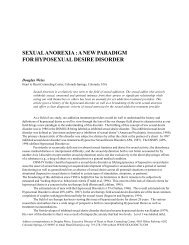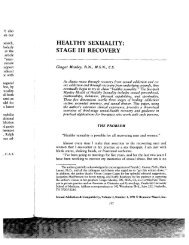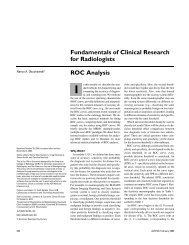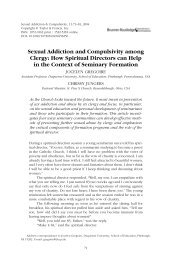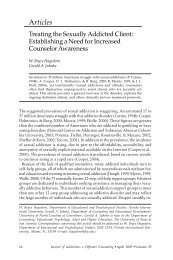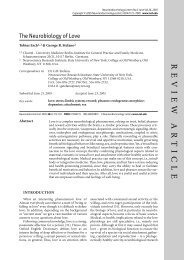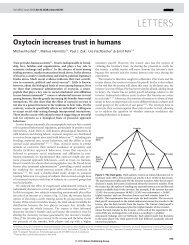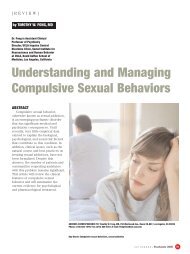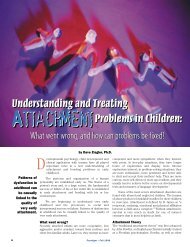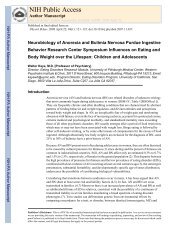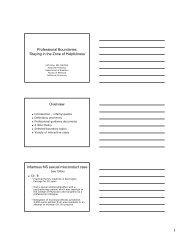An Overview of Psychiatric Ethics
An Overview of Psychiatric Ethics
An Overview of Psychiatric Ethics
Create successful ePaper yourself
Turn your PDF publications into a flip-book with our unique Google optimized e-Paper software.
Normative Ethical Theories and Psychiatry1Author Key Concepts Other issuesJ. Bentham(1748-1832)Maximising utility was to maximisethe total amount <strong>of</strong> pleasure insociety 19Higher pleasures not preferable to baseones – “pushpin is as good as poetry”Runs into the ’quantification problem’i.e. how to measure pleasureJ.S Mill(1806-1873)Cultural, intellectual, and spiritual Providespleasures are <strong>of</strong> greater value thanphysical pleasures in the eyes <strong>of</strong> a20, 21“competent judge”foundation for later formulations<strong>of</strong> preference utilitarianism, i.e. thegood relates to satisfaction <strong>of</strong> greatestnumber <strong>of</strong> preferences. “Act” and “Rule”utilitarianism distinction later outlined byR Smart 2509H. Sidgwick(1838-1900)Outlines a method <strong>of</strong> moralphilosophy based on “UniversalHedonism” (utilitarianism) 22Sidgwick’s Ideas provide the foundation<strong>of</strong> current conception <strong>of</strong> utilitarianismand highlights some conflicts betweenpersonal and collective pleasure. Rejectsmotivations as a basis <strong>of</strong> morality, rathersees “common sense” as the basis <strong>of</strong>ethical choiceG.E Moore(1873-1958)No true conception <strong>of</strong> the ethicalgood could be formulated.Maximising “ideals”, likeaestheticism, or love preferred tomere pleasure 26Advances the notion <strong>of</strong> what is laterdubbed ’informed preferences’ andeconomic views <strong>of</strong> personal preferencesR.M Hare(1919-2002)Levels <strong>of</strong> moral thinking –Sees“practical” is utilitarian and9, 27“analytic” is more complexKant’s “Kingdom <strong>of</strong> ends” asutilitarian in spirit. 27, 28 Advances a form<strong>of</strong> utilitarianism as a method <strong>of</strong> psychiatricethics. 29K. Popper(1902-1994)“Negative Utilitarianism” as theresponsibility to prevent thegreatest amount <strong>of</strong> harm or evil 30Argument reductio ad absurdum, againstnegative utilitarianism is the so-called“pin-prick argument”, which states itwould be better to painlessly destroyhumanity than allow one person toexperience a pin-prick. 31 Also criticised byR Smart 32P. Singer(1946-)Utilitarianism requires equalconsideration <strong>of</strong> interests, whateverthe species. 33 Utilitarian ideas aform <strong>of</strong> naturalism – suppressingindividual need for that <strong>of</strong> thecollective has survival advantage 24Concept <strong>of</strong> “diminishing marginal utility”argued. Adopts a “journey model”<strong>of</strong> life, which sees validity <strong>of</strong> claim toconsideration <strong>of</strong> preferences based insentience and the stage or capacityto meet life goals. Singer’s views arepolemic and have led to heated debate,in particular over the manner in which hisphilosophy appears to validate euthanasiaand abortion 34Table 1. Key Concepts in the evolution <strong>of</strong> utilitarianismIMET AN OVERVIEW OF PSYCHIATRIC ETHICS



